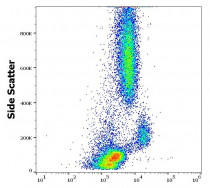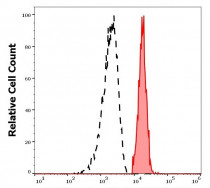ARG65452
anti-CD120a / TNFR1 antibody [H398]
anti-CD120a / TNFR1 antibody [H398] for Flow cytometry,Functional study,IHC-Frozen sections,IHC-Formalin-fixed paraffin-embedded sections,Immunoprecipitation and Human
Cell Biology and Cellular Response antibody; Cell Death antibody; Immune System antibody; Signaling Transduction antibody
Overview
| Product Description | Mouse Monoclonal antibody [H398] recognizes CD120a |
|---|---|
| Tested Reactivity | Hu |
| Tested Application | FACS, FuncSt, IHC-Fr, IHC-P, IP |
| Specificity | The clone H398 recognizes the extracellular domain of CD120a, a 55 kDa receptor for tumor necrosis factor. blocks biological activity of both natural and recombinant human TNF alpha and TNF beta. |
| Host | Mouse |
| Clonality | Monoclonal |
| Clone | H398 |
| Isotype | IgG2a |
| Target Name | CD120a / TNFR1 |
| Antigen Species | Human |
| Immunogen | Recombinant full length human CD120a |
| Conjugation | Un-conjugated |
| Alternate Names | TNF-R; p60; TNFAR; CD antigen CD120a; TNFR55; TBP1; TNF-RI; TNFR1-d2; Tumor necrosis factor receptor superfamily member 1A; FPF; TNFR60; CD120a; TNFR1; p55; TNF-R55; TNF-R-I; MS5; TNFR-I; Tumor necrosis factor receptor 1; TBPI; Tumor necrosis factor receptor type I; TNF-R1; p55-R |
Application Instructions
| Application Suggestion |
|
||||||||||||
|---|---|---|---|---|---|---|---|---|---|---|---|---|---|
| Application Note | Functional studies: Blocking. * The dilutions indicate recommended starting dilutions and the optimal dilutions or concentrations should be determined by the scientist. |
Properties
| Form | Liquid |
|---|---|
| Purification | Purified from cell culture supernatant by protein-A affinity chromatography. |
| Purity | > 95% (by SDS-PAGE) |
| Buffer | PBS (pH 7.4) and 15 mM Sodium azide |
| Preservative | 15 mM Sodium azide |
| Concentration | 1 mg/ml |
| Storage Instruction | For continuous use, store undiluted antibody at 2-8°C for up to a week. For long-term storage, aliquot and store at -20°C or below. Storage in frost free freezers is not recommended. Avoid repeated freeze/thaw cycles. Suggest spin the vial prior to opening. The antibody solution should be gently mixed before use. |
| Note | For laboratory research only, not for drug, diagnostic or other use. |
Bioinformation
| Database Links |
Swiss-port # P19438 Human Tumor necrosis factor receptor superfamily member 1A |
|---|---|
| Gene Symbol | TNFRSF1A |
| Gene Full Name | tumor necrosis factor receptor superfamily, member 1A |
| Background | CD120a / TNF R1, also known as TNFR55 or TNFRSF1A, is a 55 kDa receptor for tumor necrosis factor alpha and it is expressed in most tissues. By binding its trimeric ligand the CD120a protein forms trimers and the conformation change leads to dissociation of the inhibitory factor SODD from its intracellular death domain and in formation of signaling platform. CD120a can mediate apoptosis, and function as a regulator of inflammation. Germline mutations of the extracellular domains of this receptor were found to be associated with the autosomal dominant periodic fever syndrome. The impaired receptor clearance is thought to be a mechanism of the disease. |
| Function | Receptor for TNFSF2/TNF-alpha and homotrimeric TNFSF1/lymphotoxin-alpha. The adapter molecule FADD recruits caspase-8 to the activated receptor. The resulting death-inducing signaling complex (DISC) performs caspase-8 proteolytic activation which initiates the subsequent cascade of caspases (aspartate-specific cysteine proteases) mediating apoptosis. Contributes to the induction of non-cytocidal TNF effects including anti-viral state and activation of the acid sphingomyelinase. [UniProt] |
| Research Area | Cell Biology and Cellular Response antibody; Cell Death antibody; Immune System antibody; Signaling Transduction antibody |
| Calculated MW | 50 kDa |
| PTM | The soluble form is produced from the membrane form by proteolytic processing. |
Images (2) Click the Picture to Zoom In
-
ARG65452 anti-CD120a / TNFR1 antibody [H398] FACS image
Flow Cytometry: Human peripheral whole blood stained with ARG65452 anti-CD120a / TNFR1 antibody [H398] at 3 µg/ml dilution, followed by APC-conjugated Goat anti-Mouse antibody.
-
ARG65452 anti-CD120a / TNFR1 antibody [H398] FACS image
Flow Cytometry: Separation of human monocytes (red-filled) from CD120a negative lymphocytes (black-dashed). Human peripheral whole blood stained with ARG65452 anti-CD120a / TNFR1 antibody [H398] at 3 µg/ml dilution, followed by APC-conjugated Goat anti-Mouse antibody.
Clone References









